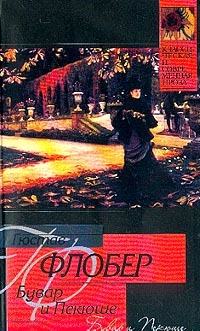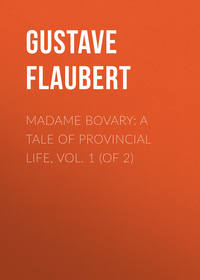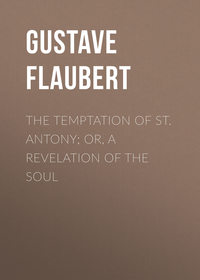 полная версия
полная версияSentimental Education; Or, The History of a Young Man. Volume 2
The ill-temper of Rosanette only increased. Mademoiselle Vatnaz irritated him with her enthusiasm. Believing that she had a mission, she felt a furious desire to make speeches, to carry on disputes, and – sharper than Rosanette in matters of this sort – overwhelmed her with arguments.
One day she made her appearance burning with indignation against Hussonnet, who had just indulged in some blackguard remarks at the Woman's Club. Rosanette approved of this conduct, declaring even that she would take men's clothes to go and "give them a bit of her mind, the entire lot of them, and to whip them."
Frederick entered at the same moment.
"You'll accompany me – won't you?"
And, in spite of his presence, a bickering match took place between them, one of them playing the part of a citizen's wife and the other of a female philosopher.
According to Rosanette, women were born exclusively for love, or in order to bring up children, to be housekeepers.
According to Mademoiselle Vatnaz, women ought to have a position in the Government. In former times, the Gaulish women, and also the Anglo-Saxon women, took part in the legislation; the squaws of the Hurons formed a portion of the Council. The work of civilisation was common to both. It was necessary that all should contribute towards it, and that fraternity should be substituted for egoism, association for individualism, and cultivation on a large scale for minute subdivision of land.
"Come, that is good! you know a great deal about culture just now!"
"Why not? Besides, it is a question of humanity, of its future!"
"Mind your own business!"
"This is my business!"
They got into a passion. Frederick interposed. The Vatnaz became very heated, and went so far as to uphold Communism.
"What nonsense!" said Rosanette. "How could such a thing ever come to pass?"
The other brought forward in support of her theory the examples of the Essenes, the Moravian Brethren, the Jesuits of Paraguay, the family of the Pingons near Thiers in Auvergne; and, as she gesticulated a great deal, her gold chain got entangled in her bundle of trinkets, to which was attached a gold ornament in the form of a sheep.
Suddenly, Rosanette turned exceedingly pale.
Mademoiselle Vatnaz continued extricating her trinkets.
"Don't give yourself so much trouble," said Rosanette. "Now, I know your political opinions."
"What?" replied the Vatnaz, with a blush on her face like that of a virgin.
"Oh! oh! you understand me."
Frederick did not understand. There had evidently been something taking place between them of a more important and intimate character than Socialism.
"And even though it should be so," said the Vatnaz in reply, rising up unflinchingly. "'Tis a loan, my dear – set off one debt against the other."
"Faith, I don't deny my own debts. I owe some thousands of francs – a nice sum. I borrow, at least; I don't rob anyone."
Mademoiselle Vatnaz made an effort to laugh.
"Oh! I would put my hand in the fire for him."
"Take care! it is dry enough to burn."
The spinster held out her right hand to her, and keeping it raised in front of her:
"But there are friends of yours who find it convenient for them."
"Andalusians, I suppose? as castanets?"
"You beggar!"
The Maréchale made her a low bow.
"There's nobody so charming!"
Mademoiselle Vatnaz made no reply. Beads of perspiration appeared on her temples. Her eyes fixed themselves on the carpet. She panted for breath. At last she reached the door, and slamming it vigorously: "Good night! You'll hear from me!"
"Much I care!" said Rosanette. The effort of self-suppression had shattered her nerves. She sank down on the divan, shaking all over, stammering forth words of abuse, shedding tears. Was it this threat on the part of the Vatnaz that had caused so much agitation in her mind? Oh, no! what did she care, indeed, about that one? It was the golden sheep, a present, and in the midst of her tears the name of Delmar escaped her lips. So, then, she was in love with the mummer?
"In that case, why did she take on with me?" Frederick asked himself. "How is it that he has come back again? Who compels her to keep me? Where is the sense of this sort of thing?"
Rosanette was still sobbing. She remained all the time stretched at the edge of the divan, with her right cheek resting on her two hands, and she seemed a being so dainty, so free from self-consciousness, and so sorely troubled, that he drew closer to her and softly kissed her on the forehead.
Thereupon she gave him assurances of her affection for him; the Prince had just left her, they would be free. But she was for the time being short of money. "You saw yourself that this was so, the other day, when I was trying to turn my old linings to use." No more equipages now! And this was not all; the upholsterer was threatening to resume possession of the bedroom and the large drawing-room furniture. She did not know what to do.
Frederick had a mind to answer:
"Don't annoy yourself about it. I will pay."
But the lady knew how to lie. Experience had enlightened her. He confined himself to mere expressions of sympathy.
Rosanette's fears were not vain. It was necessary to give up the furniture and to quit the handsome apartment in the Rue Drouot. She took another on the Boulevard Poissonnière, on the fourth floor.
The curiosities of her old boudoir were quite sufficient to give to the three rooms a coquettish air. There were Chinese blinds, a tent on the terrace, and in the drawing-room a second-hand carpet still perfectly new, with ottomans covered with pink silk. Frederick had contributed largely to these purchases. He had felt the joy of a newly-married man who possesses at last a house of his own, a wife of his own – and, being much pleased with the place, he used to sleep there nearly every evening.
One morning, as he was passing out through the anteroom, he saw, on the third floor, on the staircase, the shako of a National Guard who was ascending it. Where in the world was he going?
Frederick waited. The man continued his progress up the stairs, with his head slightly bent down. He raised his eyes. It was my lord Arnoux!
The situation was clear. They both reddened simultaneously, overcome by a feeling of embarrassment common to both.
Arnoux was the first to find a way out of the difficulty.
"She is better – isn't that so?" as if Rosanette were ill, and he had come to learn how she was.
Frederick took advantage of this opening.
"Yes, certainly! at least, so I was told by her maid," wishing to convey that he had not been allowed to see her.
Then they stood facing each other, both undecided as to what they would do next, and eyeing one another intently. The question now was, which of the two was going to remain. Arnoux once more solved the problem.
"Pshaw! I'll come back by-and-by. Where are you going? I go with you!"
And, when they were in the street, he chatted as naturally as usual. Unquestionably he was not a man of jealous disposition, or else he was too good-natured to get angry. Besides, his time was devoted to serving his country. He never left off his uniform now. On the twenty-ninth of March he had defended the offices of the Presse. When the Chamber was invaded, he distinguished himself by his courage, and he was at the banquet given to the National Guard at Amiens.
Hussonnet, who was still on duty with him, availed himself of his flask and his cigars; but, irreverent by nature, he delighted in contradicting him, disparaging the somewhat inaccurate style of the decrees; and decrying the conferences at the Luxembourg, the women known as the "Vésuviennes," the political section bearing the name of "Tyroliens"; everything, in fact, down to the Car of Agriculture, drawn by horses to the ox-market, and escorted by ill-favoured young girls. Arnoux, on the other hand, was the upholder of authority, and dreamed of uniting the different parties. However, his own affairs had taken an unfavourable turn, and he was more or less anxious about them.
He was not much troubled about Frederick's relations with the Maréchale; for this discovery made him feel justified (in his conscience) in withdrawing the allowance which he had renewed since the Prince had left her. He pleaded by way of excuse for this step the embarrassed condition in which he found himself, uttered many lamentations – and Rosanette was generous. The result was that M. Arnoux regarded himself as the lover who appealed entirely to the heart, an idea that raised him in his own estimation and made him feel young again. Having no doubt that Frederick was paying the Maréchale, he fancied that he was "playing a nice trick" on the young man, even called at the house in such a stealthy fashion as to keep the other in ignorance of the fact, and when they happened to meet, left the coast clear for him.
Frederick was not pleased with this partnership, and his rival's politeness seemed only an elaborate piece of sarcasm. But by taking offence at it, he would have removed from his path every opportunity of ever finding his way back to Madame Arnoux; and then, this was the only means whereby he could hear about her movements. The earthenware-dealer, in accordance with his usual practice, or perhaps with some cunning design, recalled her readily in the course of conversation, and asked him why he no longer came to see her.
Frederick, having exhausted every excuse he could frame, assured him that he had called several times to see Madame Arnoux, but without success. Arnoux was convinced that this was so, for he had often referred in an eager tone at home to the absence of their friend, and she had invariably replied that she was out when he called, so that these two lies, in place of contradicting, corroborated each other.
The young man's gentle ways and the pleasure of finding a dupe in him made Arnoux like him all the better. He carried familiarity to its extreme limits, not through disdain, but through assurance. One day he wrote saying that very urgent business compelled him to be away in the country for twenty-four hours. He begged of the young man to mount guard in his stead. Frederick dared not refuse, so he repaired to the guard-house in the Place du Carrousel.
He had to submit to the society of the National Guards, and, with the exception of a sugar-refiner, a witty fellow who drank to an inordinate extent, they all appeared to him more stupid than their cartridge-boxes. The principal subject of conversation amongst them was the substitution of sashes for belts. Others declaimed against the national workshops.
One man said:
"Where are we going?"
The man to whom the words had been addressed opened his eyes as if he were standing on the verge of an abyss.
"Where are we going?"
Then, one who was more daring than the rest exclaimed:
"It cannot last! It must come to an end!"
And as the same kind of talk went on till night, Frederick was bored to death.
Great was his surprise when, at eleven o'clock, he suddenly beheld Arnoux, who immediately explained that he had hurried back to set him at liberty, having disposed of his own business.
The fact was that he had no business to transact. The whole thing was an invention to enable him to spend twenty-four hours alone with Rosanette. But the worthy Arnoux had placed too much confidence in his own powers, so that, now in the state of lassitude which was the result, he was seized with remorse. He had come to thank Frederick, and to invite him to have some supper.
"A thousand thanks! I'm not hungry. All I want is to go to bed."
"A reason the more for having a snack together. How flabby you are! One does not go home at such an hour as this. It is too late! It would be dangerous!"
Frederick once more yielded. Arnoux was quite a favorite with his brethren-in-arms, who had not expected to see him – and he was a particular crony of the refiner. They were all fond of him, and he was such a good fellow that he was sorry Hussonnet was not there. But he wanted to shut his eyes for one minute, no longer.
"Sit down beside me!" said he to Frederick, stretching himself on the camp-bed without taking off his belt and straps. Through fear of an alarm, in spite of the regulation, he even kept his gun in his hand, then stammered out some words:
"My darling! my little angel!" and ere long was fast asleep.
Those who had been talking to each other became silent; and gradually there was a deep silence in the guard-house. Frederick tormented by the fleas, kept staring about him. The wall, painted yellow, had, half-way up, a long shelf, on which the knapsacks formed a succession of little humps, while underneath, the muskets, which had the colour of lead, rose up side by side; and there could be heard a succession of snores, produced by the National Guards, whose stomachs were outlined through the darkness in a confused fashion. On the top of the stove stood an empty bottle and some plates. Three straw chairs were drawn around the table, on which a pack of cards was displayed. A drum, in the middle of the bench, let its strap hang down.
A warm breath of air making its way through the door caused the lamp to smoke. Arnoux slept with his two arms wide apart; and, as his gun was placed in a slightly crooked position, with the butt-end downward, the mouth of the barrel came up right under his arm. Frederick noticed this, and was alarmed.
"But, no, I'm wrong, there's nothing to be afraid of! And yet, suppose he met his death!"
And immediately pictures unrolled themselves before his mind in endless succession.
He saw himself with her at night in a post-chaise, then on a river's bank on a summer's evening, and under the reflection of a lamp at home in their own house. He even fixed his attention on household expenses and domestic arrangements, contemplating, feeling already his happiness between his hands; and in order to realise it, all that was needed was that the cock of the gun should rise. The end of it could be pushed with one's toe, the gun would go off – it would be a mere accident – nothing more!
Frederick brooded over this idea like a playwright in the agonies of composition. Suddenly it seemed to him that it was not far from being carried into practical operation, and that he was going to contribute to that result – that, in fact, he was yearning for it; and then a feeling of absolute terror took possession of him. In the midst of this mental distress he experienced a sense of pleasure, and he allowed himself to sink deeper and deeper into it, with a dreadful consciousness all the time that his scruples were vanishing. In the wildness of his reverie the rest of the world became effaced, and he could only realise that he was still alive from the intolerable oppression on his chest.
"Let us take a drop of white wine!" said the refiner, as he awoke.
Arnoux sprang to his feet, and, as soon as the white wine was swallowed, he wanted to relieve Frederick of his sentry duty.
Then he brought him to have breakfast in the Rue de Chartres, at Parly's, and as he required to recuperate his energies, he ordered two dishes of meat, a lobster, an omelet with rum, a salad, etc., and finished this off with a brand of Sauterne of 1819 and one of '42 Romanée, not to speak of the champagne at dessert and the liqueurs.
Frederick did not in any way gainsay him. He was disturbed in mind as if by the thought that the other might somehow trace on his countenance the idea that had lately flitted before his imagination. With both elbows on the table and his head bent forward, so that he annoyed Frederick by his fixed stare, he confided some of his hobbies to the young man.
He wanted to take for farming purposes all the embankments on the Northern line, in order to plant potatoes there, or else to organise on the boulevards a monster cavalcade in which the celebrities of the period would figure. He would let all the windows, which would, at the rate of three francs for each person, produce a handsome profit. In short, he dreamed of a great stroke of fortune by means of a monopoly. He assumed a moral tone, nevertheless, found fault with excesses and all sorts of misconduct, spoke about his "poor father," and every evening, as he said, made an examination of his conscience before offering his soul to God.
"A little curaçao, eh?"
"Just as you please."
As for the Republic, things would right themselves; in fact, he looked on himself as the happiest man on earth; and forgetting himself, he exalted Rosanette's attractive qualities, and even compared her with his wife. It was quite a different thing. You could not imagine a lovelier person!
"Your health!"
Frederick touched glasses with him. He had, out of complaisance, drunk a little too much. Besides, the strong sunlight dazzled him; and when they went up the Rue Vivienne together again, their shoulders touched each other in a fraternal fashion.
When he got home, Frederick slept till seven o'clock. After that he called on the Maréchale. She had gone out with somebody – with Arnoux, perhaps! Not knowing what to do with himself, he continued his promenade along the boulevard, but could not get past the Porte Saint-Martin, owing to the great crowd that blocked the way.
Want had abandoned to their own resources a considerable number of workmen, and they used to come there every evening, no doubt for the purpose of holding a review and awaiting a signal.
In spite of the law against riotous assemblies, these clubs of despair increased to a frightful extent, and many citizens repaired every day to the spot through bravado, and because it was the fashion.
All of a sudden Frederick caught a glimpse, three paces away, of M. Dambreuse along with Martinon. He turned his head away, for M. Dambreuse having got himself nominated as a representative of the people, he cherished a secret spite against him. But the capitalist stopped him.
"One word, my dear monsieur! I have some explanations to make to you."
"I am not asking you for any."
"Pray listen to me!"
It was not his fault in any way. Appeals had been made to him; pressure had, to a certain extent, been placed on him. Martinon immediately endorsed all that he had said. Some of the electors of Nogent had presented themselves in a deputation at his house.
"Besides, I expected to be free as soon as – "
A crush of people on the footpath forced M. Dambreuse to get out of the way. A minute after he reappeared, saying to Martinon:
"This is a genuine service, really, and you won't have any reason to regret – "
All three stood with their backs resting against a shop in order to be able to chat more at their ease.
From time to time there was a cry of, "Long live Napoléon! Long live Barbès! Down with Marie!"
The countless throng kept talking in very loud tones; and all these voices, echoing through the houses, made, so to speak, the continuous ripple of waves in a harbour. At intervals they ceased; and then could be heard voices singing the "Marseillaise."
Under the court-gates, men of mysterious aspect offered sword-sticks to those who passed. Sometimes two individuals, one of whom preceded the other, would wink, and then quickly hurry away. The footpaths were filled with groups of staring idlers. A dense crowd swayed to and fro on the pavement. Entire bands of police-officers, emerging from the alleys, had scarcely made their way into the midst of the multitude when they were swallowed up in the mass of people. Little red flags here and there looked like flames. Coachmen, from the place where they sat high up, gesticulated energetically, and then turned to go back. It was a case of perpetual movement – one of the strangest sights that could be conceived.
"How all this," said Martinon, "would have amused Mademoiselle Cécile!"
"My wife, as you are aware, does not like my niece to come with us," returned M. Dambreuse with a smile.
One could scarcely recognise in him the same man. For the past three months he had been crying, "Long live the Republic!" and he had even voted in favour of the banishment of Orléans. But there should be an end of concessions. He exhibited his rage so far as to carry a tomahawk in his pocket.
Martinon had one, too. The magistracy not being any longer irremovable, he had withdrawn from Parquet, so that he surpassed M. Dambreuse in his display of violence.
The banker had a special antipathy to Lamartine (for having supported Ledru-Rollin) and, at the same time, to Pierre Leroux, Proudhon, Considérant, Lamennais, and all the cranks, all the Socialists.
"For, in fact, what is it they want? The duty on meat and arrest for debt have been abolished. Now the project of a bank for mortgages is under consideration; the other day it was a national bank; and here are five millions in the Budget for the working-men! But luckily, it is over, thanks to Monsieur de Falloux! Good-bye to them! let them go!"
In fact, not knowing how to maintain the three hundred thousand men in the national workshops, the Minister of Public Works had that very day signed an order inviting all citizens between the ages of eighteen and twenty to take service as soldiers, or else to start for the provinces to cultivate the ground there.
They were indignant at the alternative thus put before them, convinced that the object was to destroy the Republic. They were aggrieved by the thought of having to live at a distance from the capital, as if it were a kind of exile. They saw themselves dying of fevers in desolate parts of the country. To many of them, moreover, who had been accustomed to work of a refined description, agriculture seemed a degradation; it was, in short, a mockery, a decisive breach of all the promises which had been made to them. If they offered any resistance, force would be employed against them. They had no doubt of it, and made preparations to anticipate it.
About nine o'clock the riotous assemblies which had formed at the Bastille and at the Châtelet ebbed back towards the boulevard. From the Porte Saint-Denis to the Porte Saint-Martin nothing could be seen save an enormous swarm of people, a single mass of a dark blue shade, nearly black. The men of whom one caught a glimpse all had glowing eyes, pale complexions, faces emaciated with hunger and excited with a sense of wrong.
Meanwhile, some clouds had gathered. The tempestuous sky roused the electricity that was in the people, and they kept whirling about of their own accord with the great swaying movements of a swelling sea, and one felt that there was an incalculable force in the depths of this excited throng, and as it were, the energy of an element. Then they all began exclaiming: "Lamps! lamps!" Many windows had no illumination, and stones were flung at the panes. M. Dambreuse deemed it prudent to withdraw from the scene. The two young men accompanied him home. He predicted great disasters. The people might once more invade the Chamber, and on this point he told them how he should have been killed on the fifteenth of May had it not been for the devotion of a National Guard.
"But I had forgotten! he is a friend of yours – your friend the earthenware manufacturer – Jacques Arnoux!" The rioters had been actually throttling him, when that brave citizen caught him in his arms and put him safely out of their reach.
So it was that, since then, there had been a kind of intimacy between them.
"It would be necessary, one of these days, to dine together, and, since you often see him, give him the assurance that I like him very much. He is an excellent man, and has, in my opinion, been slandered; and he has his wits about him in the morning. My compliments once more! A very good evening!"
Frederick, after he had quitted M. Dambreuse, went back to the Maréchale, and, in a very gloomy fashion, said that she should choose between him and Arnoux. She replied that she did not understand "dumps of this sort," that she did not care about Arnoux, and had no desire to cling to him. Frederick was thirsting to fly from Paris. She did not offer any opposition to this whim; and next morning they set out for Fontainebleau.
The hotel at which they stayed could be distinguished from others by a fountain that rippled in the middle of the courtyard attached to it. The doors of the various apartments opened out on a corridor, as in monasteries. The room assigned to them was large, well-furnished, hung with print, and noiseless, owing to the scarcity of tourists. Alongside the houses, people who had nothing to do kept passing up and down; then, under their windows, when the day was declining, children in the street would engage in a game of base; and this tranquillity, following so soon the tumult they had witnessed in Paris, filled them with astonishment and exercised over them a soothing influence.









